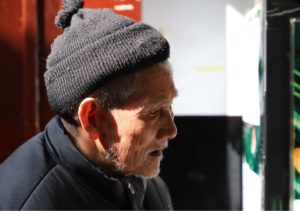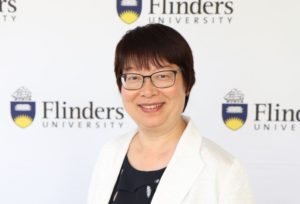
Flinders University is leading a major new program to provide high-quality support for carers of more than 11 million people living with dementia in China, or about 20% of the global dementia population.
Worldwide, around 50 million people have dementia, with that number expected to triple by 2050, says Flinders University Caring Futures Institute researcher Professor Lily Xiao, who is also leading the rollout of the iSupport self-help online project around Australia.
The project has received a $400,000 grant from the National Foundation for Australia-China Relations, an Australian Government initiative aiming to strengthen understanding and engagement between Australia and China.

The iSupport for Dementia program is an online knowledge and skills training program developed by the World Health Organization for informal carers of people living with dementia. The self-help tool is designed to prevent and/or decrease mental and physical health problems often experienced by carers of people with dementia, and to improve their quality of life.
iSupport was adapted for the Australian context and now Professor Xiao is leading a team of national and international experts to adapt iSupport into Chinese.
The program will be evaluated for its effectiveness and cost-effectiveness in a multicentre trial with 204 informal Chinese carers here in Adelaide, and in regions of Beijing, Xi’an, Taipei, Hong Kong and Macau.
Flinders University Deputy Vice-Chancellor (Research) Professor Robert Saint says this major international initiative highlights the multidisciplinary and collaborative approach of Flinders researchers to problems that impact directly on people’s lives.
“Our research leadership is improving aged and dementia care, as well as end-of-life palliative care. At a fundamental level, Flinders Caring Futures Institute research is redefining how self-care and caring can impact positively on health outcomes, quality of life and the social wellbeing of carers and those being cared for, or are self-caring.
“We’re breaking ground and making a difference in Australia and on the world stages.”
 Flinders Professor Xiao says the COVID-19 pandemic has highlighted an urgent need to have digital and agile programs like iSupport in place for vulnerable communities.
Flinders Professor Xiao says the COVID-19 pandemic has highlighted an urgent need to have digital and agile programs like iSupport in place for vulnerable communities.
“COVID-19 has accelerated the pace of change in technology and healthcare,” she says. “It’s important our informal carers of people with dementia are not left behind.
“Caring for someone with dementia comes with many complex issues around grief, loss, anxiety around the unknown and an intimate sense of responsibility. The carers’ own self-care is often overlooked, and many experience mental, physical and financial stress.
“iSupport is designed to target the needs of carers throughout their whole caring journey. Through a series of learning modules and units, carers can understand dementia itself, how it impacts someone and how a carer can better look after themselves and the person they’re caring for.”
A strong interdisciplinary team of four consortium members from Australia and five in Greater China will work collaboratively to build understanding of Chinese carers’ experiences with iSupport in those regions.

Carers will share their experiences, the impact of iSupport on their quality of life and the quality of life of the person they’re caring for, and strategies they believe that need to be implemented to scaled up the program.
Findings from the study will inform the development of multilingual versions of the program, allowing the engagement of other diverse communities.
A recent study by Professor Xiao identified the need to adapt the iSupport program into an Australian social context to complement existing services and reduce the burden for caregivers. The study examined the perspectives of informal carers and formal care staff on iSupport and its impact on dementia care education.
Research team members:
Australia: Professor Lily Xiao, Flinders University Caring Futures Institute
- Scientia Professor Henry Brodaty, The University of NSW, Centre for Healthy Brain Ageing
- Professor Julie Ratcliffe, Flinders University Caring Futures Institute
- Associate Professor Bianca Brijnath, National Ageing Research Institute
- Dr Shahid Ullah, Flinders University,
- Dr Hui-Chen Chang, University of Wollongong:
Greater China: Professor Huali Wang, Peking University
- Associate Professor Jing Wang, Xi’an Jiaotong University
- Professor Chia-Chi Chang, Taipei Medical University:
- Professor Timothy Kwok, The Chinese University of Hong Kong
- Professor Mingxia Zhu, Kiang Wu Nursing College of Macau

